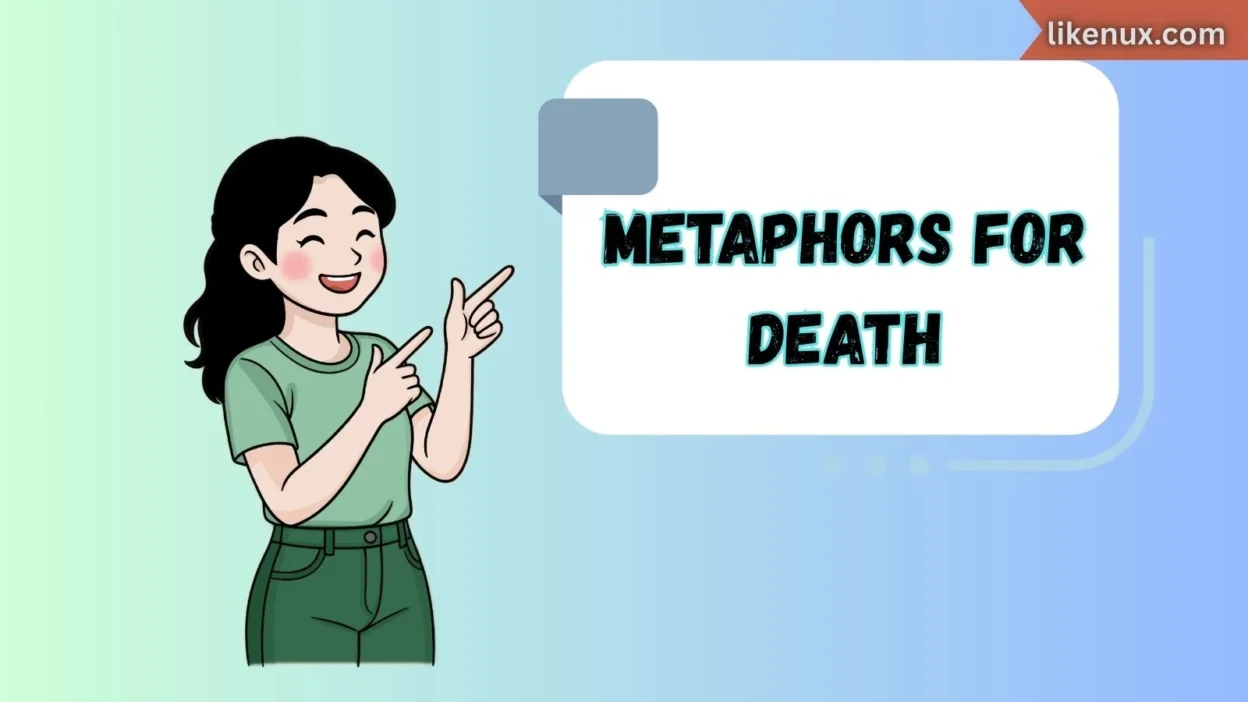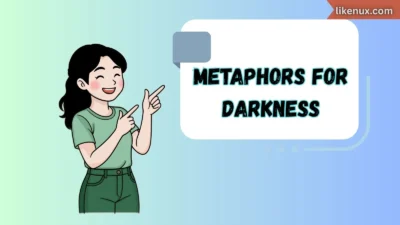Talking about death is never easy. It’s a subject that touches every heart, yet words often fall short when we try to express what it truly means. Metaphors for Death can help us find gentler, more empathetic, and meaningful ways to speak about loss. They allow us to honour the departed, bring comfort to those grieving, and reflect deeply on life’s natural cycle.
In this article, we’ll explore 25 metaphors for death—each crafted with care, reflection, and understanding. Whether you’re writing a eulogy, offering condolences, or simply trying to make sense of loss, these metaphors can guide your expression with warmth and dignity.
1. Passing Away
Meaning: A peaceful transition from life to the next stage.
In a sentence: “She passed away surrounded by her loved ones, her spirit at peace.”
Best use: This is one of the most gentle and respectful ways to describe death, often used in formal or comforting contexts.
Other ways to say: Departed, crossed over, went to a better place.
2. Crossing Over
Meaning: Moving from the physical world to the spiritual or eternal realm.
In a sentence: “He has crossed over into a world free of pain.”
Best use: Ideal when speaking of faith, spirituality, or hope beyond life.
Other ways to say: Entered eternity, transitioned, moved on.
3. Returning Home
Meaning: The soul’s return to its divine or eternal source.
In a sentence: “After a long journey, he finally returned home.”
Best use: Brings comfort to those who view death as a spiritual homecoming.
Other ways to say: Gone home, called home, reunited with the Creator.
4. The Final Rest
Meaning: Eternal peace after a life of work and struggle.
In a sentence: “May she find eternal rest in heaven’s quiet embrace.”
Best use: Often used in memorials, obituaries, and prayers.
Other ways to say: Eternal rest, peaceful slumber, forever sleep.
5. Becoming a Star
Meaning: Transforming into something eternal and shining in the sky.
In a sentence: “He’s now a star watching over us from above.”
Best use: Especially comforting when speaking to or about children.
Other ways to say: Joined the stars, shining above, became light.
6. The Long Sleep
Meaning: A metaphor for peaceful eternal rest.
In a sentence: “She has fallen into the long sleep, free from all pain.”
Best use: Poetic and gentle in tone, ideal for literary writing.
Other ways to say: Final sleep, resting forever, sleeping peacefully.
7. Fading Into the Sunset
Meaning: The end of life, portrayed as a beautiful conclusion.
In a sentence: “He faded into the sunset, leaving behind golden memories.”
Best use: Perfect for expressing closure with warmth and beauty.
Other ways to say: Rode into the sunset, end of the day, twilight of life.
8. Returning to the Earth
Meaning: The body’s return to nature’s cycle of renewal.
In a sentence: “His body returned to the earth, but his spirit lives on.”
Best use: Reflects naturalistic or eco-friendly beliefs about life and death.
Other ways to say: Back to nature, part of the soil, one with the earth.
9. The Final Chapter
Meaning: Life’s closing moment, marking the end of one’s story.
In a sentence: “Her final chapter was written with grace and courage.”
Best use: Fits well in memorial speeches or reflective writing.
Other ways to say: The end of the story, closing page, final act.
10. The Great Beyond
Meaning: The mysterious place or existence after death.
In a sentence: “He has journeyed into the great beyond.”
Best use: Ideal when speaking philosophically or spiritually.
Other ways to say: The afterlife, next realm, eternity.
11. Going to Heaven
Meaning: Ascending to a sacred, peaceful place after death.
In a sentence: “We believe she’s gone to heaven to be with the angels.”
Best use: Common in religious and faith-based contexts.
Other ways to say: Entered paradise, joined the angels, in God’s arms.
12. Joining the Ancestors
Meaning: Becoming part of the lineage of those who came before.
In a sentence: “He has joined his ancestors, watching over us with pride.”
Best use: Fits cultural and ancestral traditions beautifully.
Other ways to say: Reunited with forebears, joined the elders, in ancestral company.
13. Sailing Away
Meaning: Embarking on a final voyage beyond life’s shore.
In a sentence: “He sailed away quietly, leaving calm waters behind.”
Best use: A poetic metaphor symbolizing transition and peace.
Other ways to say: Set sail, journeyed onward, drifted beyond.
14. The Final Journey
Meaning: Life’s last adventure, moving toward eternity.
In a sentence: “Her final journey was one of courage and love.”
Best use: Evokes dignity and reflection; suitable for obituaries.
Other ways to say: Journey home, last voyage, eternal journey.
15. Becoming the Wind
Meaning: Transforming into a natural, unseen, and eternal presence.
In a sentence: “Now, he moves with the wind, touching us softly each day.”
Best use: For those who view the soul as ever-present and free.
Other ways to say: Part of the breeze, whispering wind, eternal air.
16. The Curtain Falls
Meaning: The end of life’s performance.
In a sentence: “As the curtain falls, his legacy continues.”
Best use: Ideal for artists, performers, or writers.
Other ways to say: Final bow, last act, show’s end.
17. Taken by Time
Meaning: Acknowledging that time eventually claims all life.
In a sentence: “He was taken by time, but never forgotten.”
Best use: Reflective tone for poems and eulogies.
Other ways to say: Time’s embrace, called by the years, claimed by eternity.
18. Finding Peace
Meaning: Achieving calm after the struggles of life.
In a sentence: “She has finally found peace.”
Best use: A comforting phrase in condolence messages.
Other ways to say: Rested, found serenity, eternal calm.
19. The Soul Takes Flight
Meaning: The spirit rising freely after death.
In a sentence: “His soul took flight at dawn.”
Best use: Evokes beauty, lightness, and freedom.
Other ways to say: Spirit soared, ascended, lifted away.
20. The Light Goes Out
Meaning: Life’s energy fading softly into darkness.
In a sentence: “Her light went out, but her warmth remains.”
Best use: Gentle and symbolic, perfect for emotional reflection.
Other ways to say: The flame faded, candle dimmed, final glow.
21. The River Meets the Sea
Meaning: Life’s journey merging with eternity.
In a sentence: “At last, his river met the sea.”
Best use: Poetic imagery for closure and unity.
Other ways to say: Joined the ocean, met eternity, returned to source.
22. The Call Beyond
Meaning: A divine or mysterious call summoning one from this world.
In a sentence: “He answered the call beyond.”
Best use: Spiritual tone for comforting religious messages.
Other ways to say: Called home, summoned above, divine calling.
23. Resting in the Stars
Meaning: The soul resting in the cosmos among light and beauty.
In a sentence: “She’s resting among the stars now.”
Best use: Beautiful for poetic or heartfelt expressions.
Other ways to say: In the heavens, shining above, eternal light.
24. Becoming One with the Universe
Meaning: Returning to the infinite essence of existence.
In a sentence: “He has become one with the universe.”
Best use: Ideal for philosophical or spiritual contexts.
Other ways to say: Merged with creation, cosmic return, universal peace.
25. The Silent Departure
Meaning: Leaving quietly, without pain or noise.
In a sentence: “She made her silent departure, full of grace.”
Best use: Expresses dignity and serenity in the final moment.
Other ways to say: Quiet passing, gentle farewell, peaceful exit.
FAQs About Death Metaphors
1. Why use metaphors to talk about death?
Because metaphors soften the harshness of death, offering emotional comfort and beauty to conversations about loss.
2. Which metaphor is most appropriate for a eulogy?
Phrases like “passed away,” “final journey,” or “found peace” work best for formal and heartfelt tributes.
3. Are these metaphors suitable for religious settings?
Yes. Many—such as “going to heaven” or “called home”—are deeply spiritual and comforting.
4. How can I choose the right metaphor?
Think about the person’s beliefs, personality, and life story. Choose words that honor their journey authentically.
5. Can metaphors help in grief healing?
Absolutely. Using gentle, meaningful imagery helps express emotions and bring a sense of peace and connection.
Conclusion
Death is not merely an ending—it’s a transformation, a continuation of love in a different form. These metaphors remind us that while life changes, the essence of the soul endures. Whether you are comforting someone grieving or writing in remembrance, choosing the right words can heal hearts and honor lives.
Through empathy, reflection, and compassion, we can keep the conversation about death as tender, human, and beautifully alive as life itself.

Andrew Christopher is a passionate visionary who blends creativity with purpose to bring ideas to life. With a focus on innovation and integrity, he inspires growth and lasting impact.



